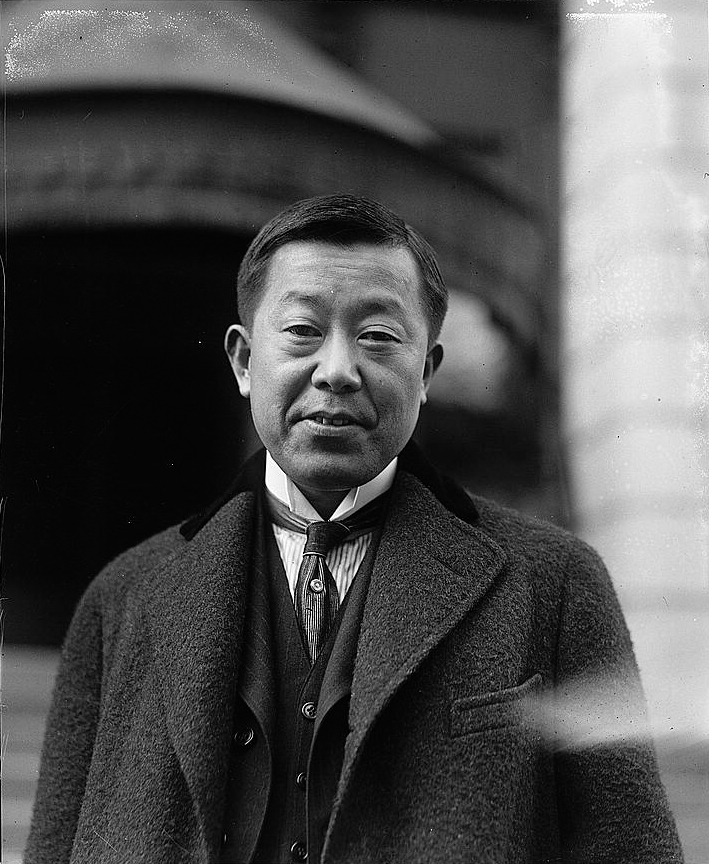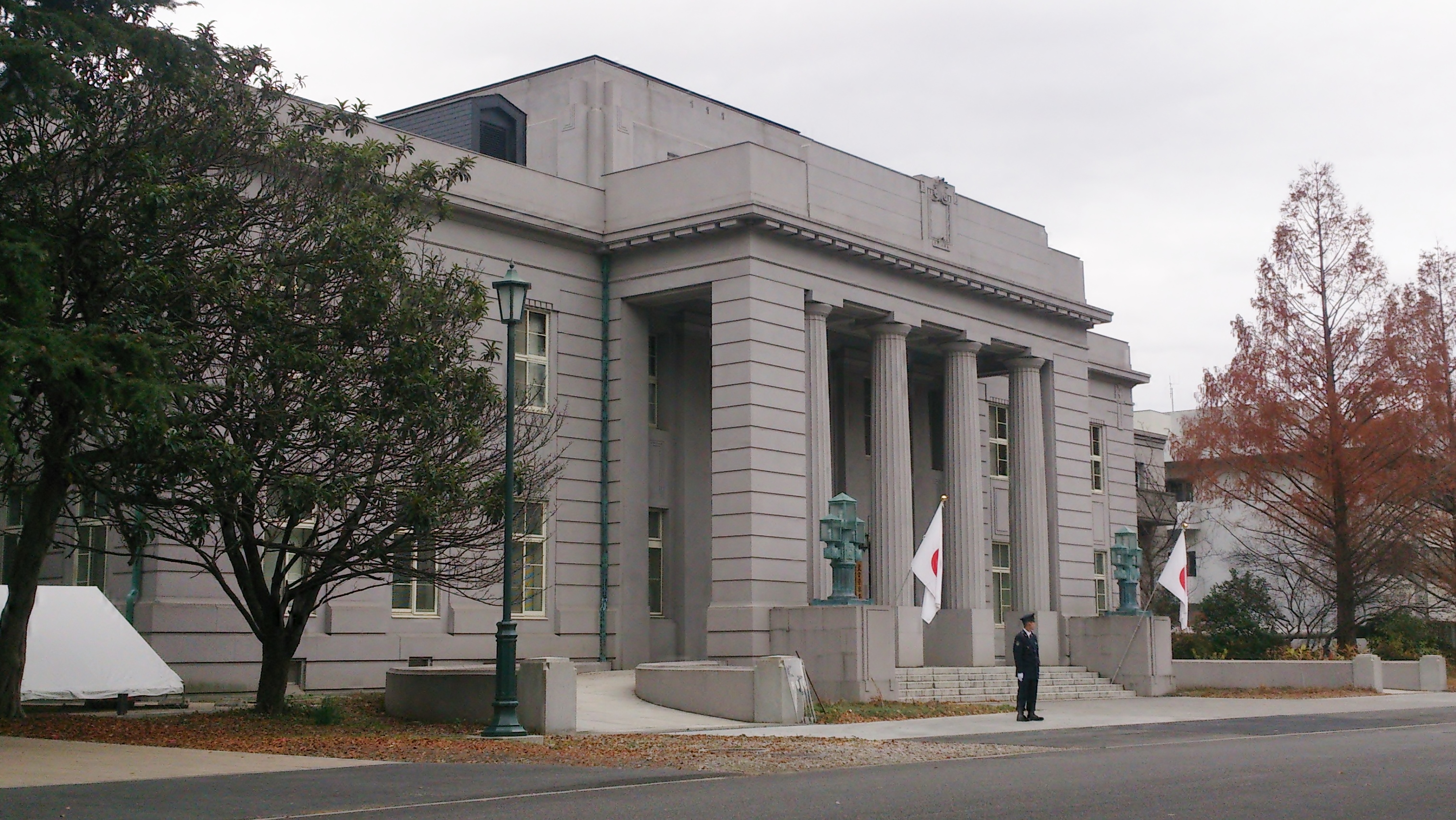|
Charles B. Warren
Charles Beecher Warren (April 10, 1870 – February 3, 1936) was an American diplomat and politician. He was United States Ambassador to Japan 1921 to 1923, United States Ambassador to Mexico in 1924, and was an unsuccessful nominee for United States Attorney General in 1925. Life Charles B. Warren was born in Bay City, Michigan, and graduated from the University of Michigan in 1891. During World War I, He served in the U.S. Army on the staff of the Judge Advocate General, ending his service with a rank of lieutenant colonel and a Distinguished Service Medal. He was an alternate delegate from Michigan to the Republican National Convention in 1908, 1912, and 1916, and a regular delegate in 1924, 1928, and 1932. Ambassador to Japan Warren served as U.S. Ambassador to Japan between 1921 and 1923. His arrival was eagerly anticipated in the context of an upcoming Washington Naval Conference on Far Eastern matters and armaments. Kaneko Kentarō (Harvard '98), Privy Councilor to ... [...More Info...] [...Related Items...] OR: [Wikipedia] [Google] [Baidu] |
United States Ambassador To Mexico
The United States has maintained diplomatic relations with Mexico since 1823, when Andrew Jackson was appointed Envoy Extraordinary and Minister Plenipotentiary to that country. Jackson declined the appointment, however, and Joel R. Poinsett became the first U.S. envoy to Mexico in 1825. The rank of the U.S. chief of mission to Mexico was raised from Envoy Extraordinary and Minister Plenipotentiary to Ambassador Extraordinary and Plenipotentiary in 1898. Normal diplomatic relations between the United States and Mexico have been interrupted on four occasions: * From December 28, 1836, to July 7, 1839 (following the secession of Texas) * From March 28, 1845, to October 2, 1848 (during the Mexican–American War) * From June 21, 1858, to April 6, 1859 (during the War of the Reform) * From March 18, 1913, to March 3, 1917 (during the Mexican Revolution; the U.S. embassy was closed on April 22, 1914, following the U.S. occupation of Veracruz). Ambassador Henry Lane Wilson was recalle ... [...More Info...] [...Related Items...] OR: [Wikipedia] [Google] [Baidu] |
Distinguished Service Medal (U
Distinguished Service Medal (DSM) is a high award of a nation. Examples include: * Distinguished Service Medal (Australia) (established 1991), awarded to personnel of the Australian Defence Force for distinguished leadership in action * Distinguished Service Medal (India) (established 1907), awarded by the British Empire to Indian citizens serving in the Indian armed forces and police * Distinguished Service Medal (Ireland), a series of three decorations issued by the Irish Defence Forces * Medal of Distinguished Service (Israel) (established 1970), awarded for exemplary bravery in the line of duty * Distinguished Service Medal (Mexico), awarded to Army and Air Force personnel who demonstrate initiative and dedication throughout the course of their military career * Coast Guard Auxiliary Distinguished Service Medal, Philippines (established 1972) * Vishista Seva Vibhushanaya or Distinguished Service Decoration (Sri Lanka) (established 1981), awarded for exceptional, distinguishe ... [...More Info...] [...Related Items...] OR: [Wikipedia] [Google] [Baidu] |
Charles G
Charles is a masculine given name predominantly found in English and French speaking countries. It is from the French form ''Charles'' of the Proto-Germanic name (in runic alphabet) or ''*karilaz'' (in Latin alphabet), whose meaning was "free man". The Old English descendant of this word was '' Ċearl'' or ''Ċeorl'', as the name of King Cearl of Mercia, that disappeared after the Norman conquest of England. The name was notably borne by Charlemagne (Charles the Great), and was at the time Latinized as ''Karolus'' (as in ''Vita Karoli Magni''), later also as '' Carolus''. Some Germanic languages, for example Dutch and German, have retained the word in two separate senses. In the particular case of Dutch, ''Karel'' refers to the given name, whereas the noun ''kerel'' means "a bloke, fellow, man". Etymology The name's etymology is a Common Germanic noun ''*karilaz'' meaning "free man", which survives in English as churl (< Old English ''ċeorl''), which developed i ... [...More Info...] [...Related Items...] OR: [Wikipedia] [Google] [Baidu] |
List Of United States Ambassadors To Mexico
The United States has maintained diplomatic relations with Mexico since 1823, when Andrew Jackson was appointed Envoy Extraordinary and Minister Plenipotentiary to that country. Jackson declined the appointment, however, and Joel R. Poinsett became the first U.S. envoy to Mexico in 1825. The rank of the U.S. chief of mission to Mexico was raised from Envoy Extraordinary and Minister Plenipotentiary to Ambassador Extraordinary and Plenipotentiary in 1898. Normal diplomatic relations between the United States and Mexico have been interrupted on four occasions: * From December 28, 1836, to July 7, 1839 (following the secession of Texas) * From March 28, 1845, to October 2, 1848 (during the Mexican–American War) * From June 21, 1858, to April 6, 1859 (during the War of the Reform) * From March 18, 1913, to March 3, 1917 (during the Mexican Revolution; the U.S. embassy was closed on April 22, 1914, following the U.S. occupation of Veracruz). Ambassador Henry Lane Wilson was recall ... [...More Info...] [...Related Items...] OR: [Wikipedia] [Google] [Baidu] |
Masanao Hanihara
was a Japanese diplomat. Biography He was born on August 25, 1876. He came to the United States in 1902 as a member of the Japanese Embassy at Washington, D.C., was consul general at San Francisco in 1916–18, then returned to Japan as director of the Bureau of Commerce of the Japanese Foreign Office. He was a member of the Ishii Mission from which came the Lansing–Ishii Agreement. He was also an influential member of the Washington Disarmament Conference. In December 1922, he was appointed ambassador to the United States, and arrived in Washington in February 1923. His protest, in April 1924, on the passage of the immigration law by the United States government because it would bar the admission of Japanese to the country, was interpreted as "a veiled threat" by the Senate, and had quite an opposite effect from that intended. After the passage of the bill, It was rumored that Hanihara was to be recalled by the Japanese government. Although this was denied, it was soon ... [...More Info...] [...Related Items...] OR: [Wikipedia] [Google] [Baidu] |
Tokugawa Iesato
Prince was the first head of the Tokugawa clan after the overthrow of the Tokugawa bakufu, and a significant figure in Japanese politics and diplomacy during the Meiji, Taishō and early Shōwa period Japan. When Prince Tokugawa travelled to other nations representing Japan during his diplomatic journeys, he usually presented his name being Prince Iyesato Tokugawa. Prince Tokugawa held the influential position of president of Japan's upper house of congress the Diet for 30 years. Tokugawa promoted democratic principles and international goodwill. It was only after his passing in 1940 that Japanese militants were able to push Japan into joining the Axis Powers in WWII. Early life Tokugawa Iesato was born to the Tayasu branch of the Tokugawa clan, under the name Kamenosuke, he became its 16th head on June 19, 1868, following the resignation of the last ''shōgun,'' Tokugawa Yoshinobu. His brothers were Tokugawa Satotaka and Tokugawa Takachiyo, who also held the Tayasu head ... [...More Info...] [...Related Items...] OR: [Wikipedia] [Google] [Baidu] |
Uchida Kosai
Uchida (written: 内田 lit. "within ricefield") is a Japanese surname. Notable people with the surname include: *Aguri Uchida (born 1949), a Japanese watercolour painter *Akiko Uchida (born 1985), a Japanese volleyball player *Asahi Uchida (born 1982), a Japanese actor *Atsuto Uchida, a Japanese football player *Aya Uchida (born 1986), a Japanese voice actress *, Japanese footballer *Hyakken Uchida, (1889–1971), a Japanese author and academic *Irene Uchida (1917–2013), Canadian scientist and researcher *Jun Uchida, a Japanese football player *Uchida Kakichi (1866–1933), a Japanese politician *Kaichi Uchida, a Japanese tennis player *Katherine Uchida (born 1999), a Canadian rhythmic gymnast *Kenji Uchida, a Japanese anime producer *Kenji Uchida (film director), a Japanese film director *Kenta Uchida, a Japanese football player *, Japanese footballer *Uchida Kosai (1865–1936), a Japanese statesman *Uchida Kuichi (1844–1875), a Japanese photographer *Makoto Uchida (game devel ... [...More Info...] [...Related Items...] OR: [Wikipedia] [Google] [Baidu] |
Privy Council (Japan)
The was an advisory council to the Emperor of Japan that operated from 1888 to 1947. It was largely used to limit the power of the Imperial Diet. Functions Modeled in part upon the Privy Council of the United Kingdom, this body advised the Japanese Empire on matters including, but not limited to: * Proposed amendments to the Constitution of the Empire of Japan * Proposed amendments to the 1889 Imperial Household Law * Matters of constitutional interpretation, proposed laws, and ordinances * Proclamations of martial law or declaration of war * Treaties and other international agreements * Matters concerning the succession to the throne * Declarations of a regency under the Imperial Household Law; * Matters submitted by the Emperor directly The Privy Council had both judicial functions and certain executive functions. However, the council had no power to initiate legislation. Establishment To oversee new governmental developments, in 1871, three councils were created - ... [...More Info...] [...Related Items...] OR: [Wikipedia] [Google] [Baidu] |
Kaneko Kentarō
was a statesman, diplomat, and legal scholar in Meiji period Japan. A graduate of Harvard Law School, he drew on his connections in the American legal community over the course of his long career in Japanese government, particularly in his role helping to draft the new Meiji Constitution. Early life Kaneko was born into a ''samurai'' family of Fukuoka Domain (Chikuzen Province's Sawara district, present-day Chūō-ku, Fukuoka), being the son of Kaneko Naomichi (1821-1876), leader of the Ansei Expedition to the Philippines in 1855. At the age of 9, he began his studies at the Shuyukan Han school. At 19, he was selected as a student member of the Iwakura Mission, and journeyed to the United States. He remained there while the rest of the mission continued on to Europe, with the instruction to obtain an education in any subject. At first, seeking a naval career, he planned to attend the United States Naval Academy in Maryland, but a doctor assessed his physical fortitude as in ... [...More Info...] [...Related Items...] OR: [Wikipedia] [Google] [Baidu] |
The New York Times
''The New York Times'' (''the Times'', ''NYT'', or the Gray Lady) is a daily newspaper based in New York City with a worldwide readership reported in 2020 to comprise a declining 840,000 paid print subscribers, and a growing 6 million paid digital subscribers. It also is a producer of popular podcasts such as '' The Daily''. Founded in 1851 by Henry Jarvis Raymond and George Jones, it was initially published by Raymond, Jones & Company. The ''Times'' has won 132 Pulitzer Prizes, the most of any newspaper, and has long been regarded as a national "newspaper of record". For print it is ranked 18th in the world by circulation and 3rd in the U.S. The paper is owned by the New York Times Company, which is publicly traded. It has been governed by the Sulzberger family since 1896, through a dual-class share structure after its shares became publicly traded. A. G. Sulzberger, the paper's publisher and the company's chairman, is the fifth generation of the family to head the p ... [...More Info...] [...Related Items...] OR: [Wikipedia] [Google] [Baidu] |





.png)